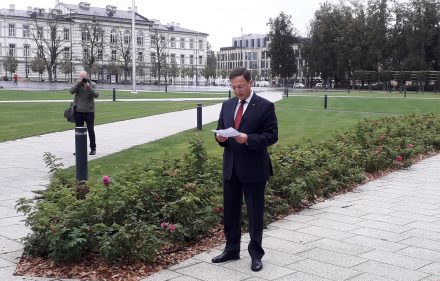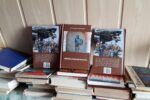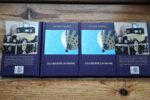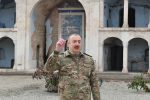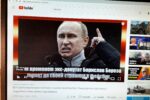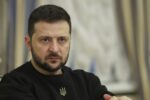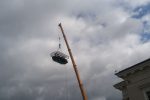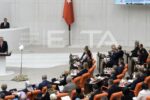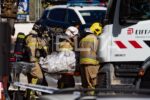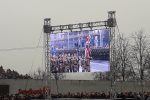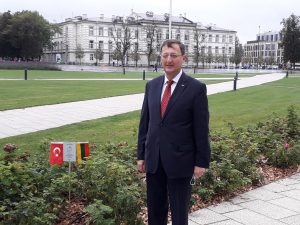
Interview with the Ambassador of the Republic of Turkey GÖKHAN TURAN on the Occasion of the 5th Anniversary of the July 15 Coup Attempt by Journalist GINTARAS VISOCKAS
Turkish-Lithuanian relations go back as far as to the relations established between the Ottoman Empire and the Commonwealth of Poland and Lithuania, when at the time both states shared borders, had trade concessions and upheld strategic objective of maintaining balance of power in the region. In modern times our first diplomatic agreement goes back to 17 September 1930 Friendship Agreement, then interim period of Soviet occupation of Lithuania which was never recognized by Turkey. Following the reconstitution of independence of Lithuania in 1990, Turkey became one of the first countries to open a resident embassy in Vilnius. In short, we have a unique long history of acquaintance.
In the context of our mutual relations, it would be appropriate to recognize that today has become an important day in the history of Turkish nation five years ago, when a coup attempt was staged against her democracy and elected Government of the day.
Q. For the Lithuanian readers let me ask you, what exactly has happened five years ago in Turkey on July 15th, 2016?
The treacherous coup attempt took place on July 15, 2016, will be remembered as a black mark that targeted Turkish democracy. The coup attempt, which was organized by a group of soldiers who were members of/or affiliated with the Fetullah Terrorist Organization (FETO), aimed to assassinate President Erdoğan and replace both the constitutional order and parliamentary democracy with a military junta.
On the night of July 15th, it was clear that FETO affiliates carried an assault on Turkish democracy. The scene which Turkey woke up to on the morning of July 16th was tragic. What occurred was a night of terror under the wrath of helicopter gunships, tanks and F-16 jets. The events resulted in the loss of lives of 251 people. Over 2500 were maimed or wounded had been left behind. The coup plotters, among various other places, bombed the Turkish Parliament, attacked the buildings of the Presidential Complex, the police headquarters and the National Intelligence Organization (NIO), targeted some media organizations and the Turkish Satellite Center (Turksat).
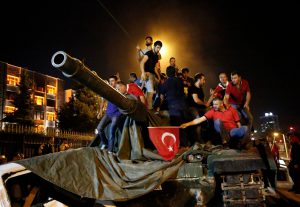
However, tens of thousands of unarmed civilians poured into the streets of Turkish cities to protect Turkish democracy and its legitimately elected Government, and resisted to the coup plotters. As a result of a rare epic resistance of a nation in world history, the coup attempt was repulsed.
This was not only the most murderous coup attempt in Turkish history, but also the most organized terrorist attack, which Turkey had ever been subjected to. Then U.S. Vice-President Joe Biden, on a visit to Turkey after the July 15th coup attempt, would refer to the coup attempt as “Turkey’s September 11th.”
Can you imagine Lithuanian jet fighters bombing the Seimas, US war planes dropping bombs on Capitol Hill or German air force targeting the Bundestag; while helicopters firing on crowds of people gathering in front of the Presidential Office? It might be difficult for you to imagine this, but in Turkey this has happened. It was a horrible reality Turkish people faced that night.
Q. How many soldiers actually participated in the coup?
Over 10,000 military and civilian members of FETO organization, 35 military planes, 74 tanks, 246 armored vehicles, 3 military ships, 3992 weapons and 37 military helicopters participated and played a role in the coup attempt.
Q. Who was behind the July 15th coup attempt?
Even as our Parliament, presidential palace, and police headquarters were under fire — and as Turks rallied in the streets and stood before the tanks — Turkish prosecutors began their work to understand who was behind the coup. Irrefutable evidence quickly emerged pointing to the Fetullahist Terror Organization (FETÖ) — a dangerous clandestine group within Turkey, the United States, and other countries around the world that has been nurtured by Fetullah Gülen over the past 40 years. Gülen today lives on an estate in Saylorsburg, Pennsylvania.
Solid pieces of evidence obtained in the trials revealed that the power behind the treacherous coup attempt was the FETO organization. These substantial pieces of evidence include essential audio and video recordings of the coup night, correspondences between the coup plotters, other information and documents, confessions and witness statements of the captured coup plotters.
Q. Who is FETO and what is the nature of this organization, which may be a difficult to understand for an outsider?
To judge the deeds of FETÖ (Fetullah Terrorist Organization) only with what transpired on July 15th would be inadequate. The crimes committed on the night of July 15th were just the tip of an iceberg.
FETO is an armed cult organization made up of fanatic people who came together with the directives of their ringleader Fetullah Gülen. He is the so-called “messianic” leader of this clandestine, criminal and terrorist organization. FETÖ is unprecedented in terms of its global reach, ambitions and methods. The ringleader Gülen is on the Ministry of Interior’s ‘most wanted terrorists list’s ‘Red’ category.
It all started under the guise of a charitable education effort back in the 1970s. Fetullah Gülen and his followers disguised themselves as a benign education movement, when they started the campaign of establishing schools in Turkey and later around the world. At the peak of their power, they controlled thousands of schools in Turkey and more than eight hundred educational institutions worldwide. In terms of their reach, they were unprecedented.
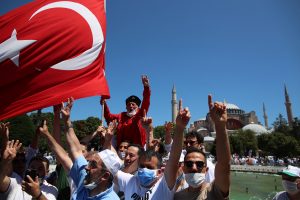
We now understand that this was the first step of an infiltration campaign where kids and their parents were recruited with the seemingly innocent promise of a better education and a good job. These kids were put through school with academic and financial help and a heavy hand in indoctrination. They turned into unquestioning foot soldiers of Fetullah Gülen who claims to be the “Chosen One”. The goal was to subvert the democratic foundations of the Turkish state and establish a new anti-democratic one under the absolute rule of Gülen. His students were made to believe that, in order to achieve their main goal of taking the control of the state, they should remain hidden and very cautious, and that they are allowed to avoid all ethical and religious rules and principles. Attaching great importance to confidentiality in its structure, and calling the confidentiality as „precaution”, the organization gives „code names” to its members apart from their real names to ensure secrecy. In this way, this is a unique and peculiar armed terrorist organization where even its lower-level members know each other by their code names and has a „cell-type” structure.
There were mass-scale exam cheating cases in order to infiltrate critical government posts like Police Departments and Military Schools.
As its strength grew, the organization began to claim a global messianic mission, depicting Fetullah Gülen as the “Imam of the Universe”.
The crime syndicate behind all this devised and ran an integrated system that took care of recruitment through schools; financing was taken care of by holding companies and donations from business people. The organization also established media houses to shape the public opinion for and against any person, group or idea. Many people in Turkey who saw the organization for what it really is, got psychologically and socially lynched through these media houses. These media houses became the focal point of lynch campaigns conducted against journalists, academics, bureaucrats and military officers who opposed them, or tried to expose them.
Turkish judicial authorities rendered numerous conviction decisions against members of this crime syndicate due to its various criminal acts, such as illegal wiretapping, fabricating evidence and unlawful arrests of those who opposed the organization. The ongoing and finalized investigations, prosecutions and trials yielded that Fetullah Gülen is the administrator and ringleader of FETÖ armed terrorist organization and that he gave the order to stage the coup.
As the Turkish Government understood what was actually in place, the necessary legal actions were taken against FETÖ. In particular, the disclosure of their secret communication systems was instrumental.
July 15th was plotted at the time when the Turkish Government had discovered and listed most of the so-called military personnel who were actually recruits of FETÖ and thus was getting ready to dismiss them. In other words, it was also a desperate final move by FETÖ to keep their influence and control in place in Turkey.
15 July armed coup attempt demonstrated that FETÖ is not refraining to use terror tactics even against civilians, alongside other crimes, and has clearly shown to the world that it is one of the most dangerous groups against democratic governance.
Their presence and modus operandi is the same in education, NGOs and local businesses around the world. As they aim to infiltrate and enlarge their global economic and political influence, we think that they constitute a direct security threat for any country where they operate through affiliated people and institutions. Lithuania is not an exception to this. Turkey will continue to explain and warn friends and allies all over the world to be careful in relation to the ill-intentioned and poisonous activities of this terrorist organization.
Q. What steps has Turkey taken against this organization to preserve its democracy and stability?
In the past five years, the fight against FETO both inside and outside Turkey has constituted one of the main priorities of our government. Within Turkey, our efforts are being conducted under three pillars:
Firstly, on the basis of the rule of law, the perpetrators of the 15th of July coup attempt have been brought to justice. Still several judicial processes are undergoing by relevant authorities and investigations continue in relation to FETÖ in our country.
Secondly, FETO’s organizational structure within governmental institutions has been unveiled; administrative and judicial procedures have been initiated against its members and hence the “parallel state structure” has been brought down.
Thirdly, apart from those within the governmental institutions, FETO’s attempts to spread across all areas of the economy via its shell entities, particularly in the education, media and banking sectors, have been thwarted inside our country.
Meantime, FETO has undergone a significant transformation. The organization, which lost its backbone in Turkey, is now trying to survive by making use of its organizational structure abroad. Thus, fighting against FETO abroad has gained more significance.
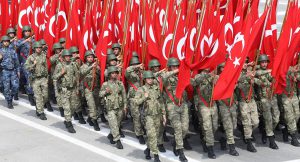
The fight against FETO structures abroad has been among the top priorities of our country. Our efforts can be summarized as follows:
a) The main objective of our efforts is to raise awareness in other countries against this group. Several international organizations have adopted vital resolutions regarding FETÖ. Moreover, countries that have investigated and monitored this group have often found that they are involved in crimes such as money laundering, intimidation, bribery and passport/visa fraud.
b) We have requested the extradition and the freezing of the assets of FETÖ members from the countries where these persons are located.
c) The Turkish Maarif (Education) Foundation also maintains its activities around the world to prevent any shortfalls resulting from the steps taken against FETO, especially in the field of education. In addition to FETÖ affiliated schools being taken over by the relevant education bodies in almost 40 countries, in more than 20 of these the affiliated schools and education centers have been transferred to the Turkish Maarif Foundation. Also, Turkish Maarif Foundation has opened schools in over 20 countries.
Q. Who saved democracy on that evening in Turkey?
Although the 15 July coup was planned down to the intricate details, there are two key factors that prevented the successful conclusion of the coup. One of these was the fact that FETO members within the military began the coup two hours earlier than planned because they suspected that the National Intelligence Organization and Turkish Army Headquarters had become aware that something was going to happen. However, the main factor was the Turkish people who took to the streets upon President Erdoğan’s call.
There were dozens of democracy vigils in Turkish cities which were attended by millions of our citizens from all supporters of the political spectrum.
After the attempted coup, President Erdoğan and Prime Minister Binali Yıldırım, and leaders of opposition parties came together in a mass rally on 7 August 2016 in İstanbul. This mass rally was a historical expression of national resolve and the first case in which all parties gathered in a political rally for a common cause. Over 3 million Turkish citizens’ participation has also made this rally one of the most crowded rallies in recent Turkish political history.
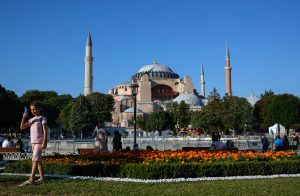
Turkey’s religious leaders of all faiths, Muslims, Christians and Jewish were all united in their condemnation of FETO’s coup attempt and issued a joint statement. In summary, the will and resolve of Turkish people at large saved Turkish democracy and constitutional order.
Q. Lithuania and Turkey are both NATO members. As part of the same alliance, what are some of the challenges facing us both today?
Since Lithuania became NATO member, Alliance’s understanding of threats have changed. For instance, we increasingly talk about threats to democracy and stability through hybrid threats, and also cyber security. It is interesting to note that FETO organization were rather capable in posing a threat to democracy via their cyber security capabilities, too. These type of new challenges do not recognize any boundaries. We need to develop awareness and capabilities to combat them.
In the last several years in NATO and in Europe at large, there is a growing awareness on hybrid threats and their components. While technological advantages help overcoming hybrid threats, stronger general awareness is definitely needed. Disinformation, fake news and propaganda have become tools of manipulation for extremist and many other marginal groups. Stronger media literacy is required to meet these challenges accompanied by democratic society‘s resilience.
Having higher awareness of regional threats will also surely enhance the quality of security. As for Turkey, we recognize the significance of regional security for Baltics. Thus, we contribute to the Baltic Air Policing Mission with four F-16 jets, we support financially and also with an officer the NATO Energy Security Excellence Center in Vilnius in addition to other cooperation forms in NATO.
As regards our overall national security concept, rule-based and predictable international order is the preferred environment for both our states, for enhanced democracy and welfare of our people.
Q. What is the cooperation potential between two countries in other areas?
As pointed earlier, we are not only members of the NATO alliance, we are also allies in our mutual values of democracy, freedom of speech, free market economy and way of life respectful to one’s faith.
While you have become a member of the EU, Turkey’s long accession process is still under way. Although the negotiation process has been stalled for several years now, we aspire to become full member of the EU in due course. We are part of European landscape and history, bearing in mind Europe is a heterogeneous entity. Political wisdom and strategic outlook is needed to transcend some of the existing blockages. Still we have broad-based cooperation emanating from several official agreements, including Customs Union with the EU. Lithuania’s support towards Turkey’s EU membership bid, based on her unique experience is much appreciated in Turkey. We would prefer it to be more vocal and noticeable.
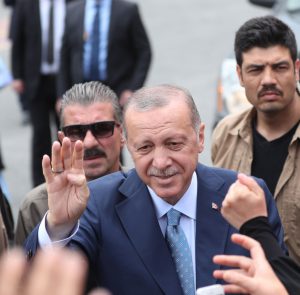
We have supported Lithuania’s bid for practically every regional and global organization in the last 30 years. Our support for your NATO membership process was perhaps the most important among them.
In economic relations, our bilateral potential is under-utilized. Last year despite Covid-19 pandemic conditions, our bilateral trade volume has reached 765 million Dollars. Turkey is the 7th largest economy in Europe and 18th in the world. It offers great opportunities for Lithuanian businesses. There also need to be more awareness on opportunities Lithuania offers to Turkish business people. Our economies can be considered mutually complementary in many aspects. For instance, in terms of logistics and transportation both countries can function as regional hubs for each other.
There is a huge potential in defense industry cooperation. A wide range of Turkish defense industry products, especially state of the art Turkish civilian and military drones may be interesting for Lithuanian army and security institutions.
More Turkish students are starting to discover global education opportunities through various programs such as “Erasmus”. Lithuanian universities English programmes are very popular to Turkish Erasmus students.
We have historical people to people connection via Lithuanian Tatars and Karaites communities. We have a large Tatar community from Crimea in Turkey as well.
We are also happy to see that Turkey is traditionally among the most preferred destinations for Lithuanian tourists. In 2019, the last year before the pandemic 230.000 Lithuanians visited Turkey. This was a record which we want the break in the coming years. We welcome people to people contact, look forward to developing our mutual potential further.
2021.07.15; 05:00

